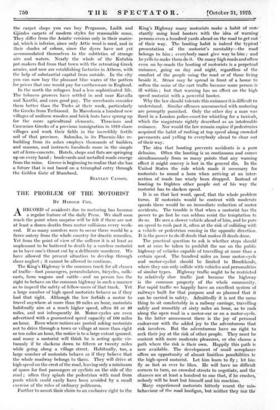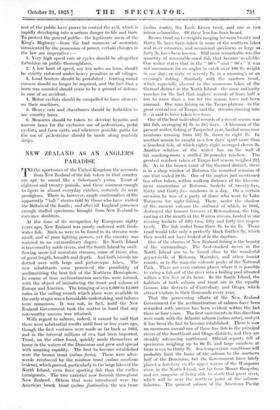A RECORD of accidents due to motoring has become a regular
feature of the daily Press. We shall soon reach the point when surprise will be felt if there are not at least a dozen deaths from motor collisions every week- end. If as many murders were to occur there would be a fierce outcry from the whole country for drastic remedies. Yet from the point of view of the sufferer it is at least as unpleasant to be battered to death by a careless motorist as to have one's throat cut by a deliberate murderer. We have allowed the present situation to develop through sheer neglect ; it cannot be allowed to continue.
The King's Highway is the common track for all classes of traffic—foot passengers, perambulators, bicycles, milk- carts, farm wagons and cattle—and no person has the right to behave on the common highway in such a manner as to imperil the safety of fellow-users of that track. Yet a large number of high speed motorists behave as if they had that right. Although the law forbids a motor to travel anywhere at more than 20 miles an hour, motorists habitually aim at a much higher speed, often 35 or 40 miles, and not infrequently 50. Motor-cycles are even advertised with a guaranteed speed capacity of 100 miles an hour. Even where notices are posted asking motorists not to drive through a town or village at more than eight or ten miles an hour, the notice is to a large extent ignored. and many a motorist will think he is acting quite vir- tuously if he slackens down to fifteen or twenty miles while going along a village street. Habitually, too, a large number of motorists behave as if they believe that the whole roadway belongs to them. They will drive at high speed on the crest of the road, leaving only a minimum of space for foot passengers or cyclists on the side of the road ; often they splash the pedestrian with mud from pools which could easily have been avoided by a. small exercise of the rules of ordinary politeness.
Further to assert their claim to an exclusive right to the King's Highway many motorists make a habit of con- stantly using loud hooters with the idea of warning persons even a hundred yards ahead on the road to get out ' of their way. The hooting habit is indeed the typical presentation of the motorist's mentality—the road • belongs to him ; everybody must give way to him ; and he yells to make them do it. On many high roads and often even on by-roads the hooting of motorists is a perpetual nuisance, going on day and night, regardless of the comfort of the people using the road or of those living beside it. Straw may- be spread in front of a house to soften the noise of the cart traffic because some person is ill within ; but that warning has no effect on the high speed motorist with a powerful hooter.
Why the law should tolerate this nuisance it is difficult to understand. Similar offences unconnected with motoring are promptly punished. Only the other day a man was fined in a London police-court for whistling for a taxicab, which the magistrate rightly described as an intolerable nuisance. Nor would the law remain supine if pedestrains acquired the habit of rushing at top speed along crowded pavements and yelling to everybody ahead to clear out of their way.
The idea that hooting prevents accidents is a pure delusion. Often the hooting is so continuous and comes simultaneously from so many points that any warning effect it might convey is lost in the general din. In the United States the rule which made it necessary for motorists to sound a horn when arriving at an inter- section of roads has wisely been dropped. Instead of hooting to frighten other people out of his way the motorist has to slacken speed.
It is on that last word, speed, that the whole problem turns. If motorists would be content with moderate speeds there would be an immediate reduction of motor accidents. The trouble is that when a motorist has the power to go fast he can seldom resist the temptation to do so. He sees a slower vehicle ahead of him, and he puts on speed to rush past it, often at the risk of colliding with a vehicle or pedestrian coming in the opposite direction. It is the power to do ill deeds that makes ill deeds done.
The practical question to ask is whether steps should not at once be taken to prohibit the use on the public highway of vehicles capable of travelling at more than a certain speed. The hundred miles an hour motor-cycle and motor-cyclist should be limited to Brooklands, where they can only collide with vehicles and personalities of similar types. Highway traffic ought to be restricted to relatively slow traffic just because the highway is the common property of the whole community. For rapid traffic we happily have an excellent system of railways built for that purpose and so planned that it can be carried in safety. Admittedly it is not the same thing to sit comfortably in a railway carriage, travelling safely and smoothly at sixty miles an hour, as to rush along the open road in a motor-car or on a motor-cycle. In the latter amusement there is the joy of personal endeavour with the added joy to the adventurous that risk involves. But the adventurous have no right to seek their joy at the risk of other people. They must be content with more moderate pleasures, or else choose a path where the risk is their own. Happily this path is now available. The development of small aeroplanes offers an opportunity of almost limitless possibilities to the high-speed motorist. Let him learn to fly ; let him fly as fast as ever he likes. He will have no difficult corners to turn, no crowded streets to negotiate, and the chances are at least a hundred to one that, if he crashes, nobody will be hurt but himself and his machine.
Many experienced motorists bitterly resent the Inis- behaviour -of the road hooligan, but neither they nor the rest of the public have power to control the evil, which is rapidly developing into a serious danger to life and limb. To protect the general public—the legitimate users of the King's Highway—from the bad manners of motorists intoxicated by the possession of power, certain changes in the law are imperative :- 1. Very high speed cars or cycles should be altogether forbidden on public thoroughfares.
2. A low limit of speed, say ten miles an hour, should be strictly enforced under heavy penalties in all villages.
3. Loud hooters should be prohibited ; hooting round corners should no longer be required, and the fact that a horn was sounded should cease to be a ground of defence in case of an accident.
4. Motor cyclists should be compelled to have silencers on their machines.
5. Heavy cars and charabanes should be forbidden to use country lanes.
6. Measures should be taken to develop bypaths and narrow lanes for the exclusive use of pedestrians, pedal cyclists, and farm carts, and wherever possible paths for the use of pedestrians should be made along roadside strips.































































 Previous page
Previous page